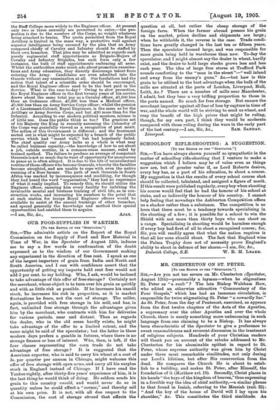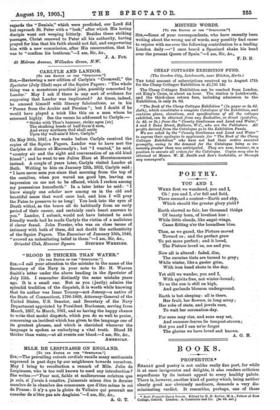SIR,—Are you not too severe on Mr. Chesterton (Spectator, August
12th)—presumably a layman—when he stigmatises St. Peter as "a snob " ? The late Bishop Walsham How, who edited an otherwise attractive "Commentary of the Four Gospels," which has had an immense circulation, is responsible for twice stigmatising St. Peter "a cowardly liar." As St. Peter, from the day of Pentecost, exercised, as appears from the first twelve chapters of the Acts of the Apostles, a supremacy over the other Apostles and over the whole Church, there is surely something more unbecoming in such language from one claiming to be a Bishop. It has always been characteristic of the Spectator to give a preference to sweet reasonableness and reverent discussion in the treatment of religious subjects. Hundreds of your Christian readers will thank you on account of the rebuke addressed to Mr. Chesterton for his abominable epithet in regard to St. Peter, whose supreme authority was given him by Christ under three most remarkable similitudes, not only during our Lord's lifetime, but after His resurrection from the dead. He compares the Church He is about to estab- lish to a building, and makes St. Peter, after Himself, the foundation of it (Matthew xvi. 18). Secondly, Christ places in his hands the keys of the kingdom of heaven," thus expressing in a forcible way the idea of chief authority,—a similar phrase to that found in Isaiah, referring to the Messiah (xxii. 22): "And the key of the house of David will I lay upon his shoulder," &c. This constitutes the third similitude. As
regards the "Denials," which were predicted, our Lord did but reproach St. Peter with a "look," after which His loving disciple went out weeping bitterly. Besides these striking 'passages, Christ renewed to Peter all his authority, having prayed for him that his faith should not fail, and empowering him with a new commission, after His resurrection, that he was to "confirm his brethren."—I am, Sir, &c., J. A. Fox.
48 Melrose Avenue, Willesden Green, N.W.



































 Previous page
Previous page